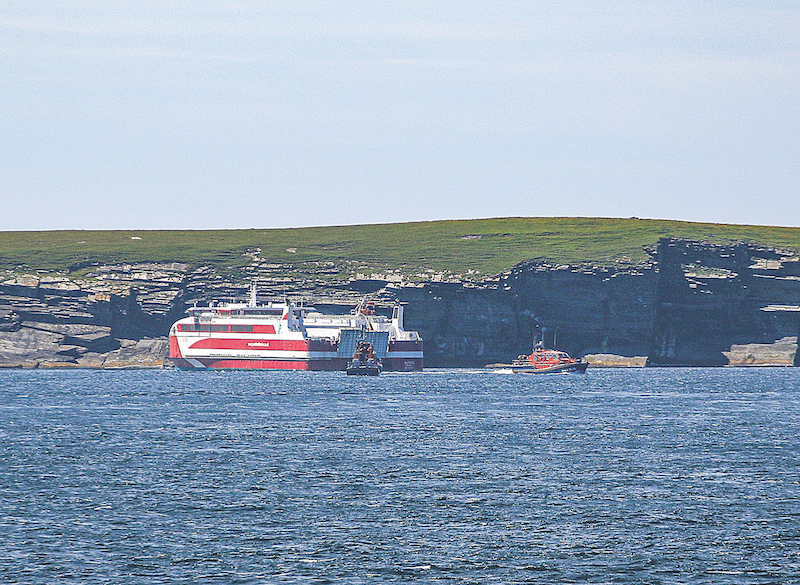Marine investigators release mv Alfred report
The master of mv Alfred “almost certainly fell asleep” before the ferry grounded on Swona in 2022, marine accident investigators have found.
Releasing its report on the incident today, the Marine Accident Investigation Branch (MAIB) has also found that the master of the vessel “routinely operated very close to the coast.”
This left “little margin for error when they found themselves in an unsafe situation,” according to the investigators, who have praised Pentland Ferries for the work it has done since the incident.
The report says that the master “was effectively navigating the vessel alone” at the time of the grounding which, investigators say, meant that his loss of awareness “went unnoticed.”
The Alfred grounded in waters controlled by Orkney Islands Council Harbour Authority. However, investigators have found that the harbour’s vessel traffic service was not monitoring the movement of the ferry and did not raise the alarm when it entered the “guard zone” around Swona.
The MAIB says it is encouraged by actions already taken by Pentland Ferries to address the issues raised in this report. Orkney’s Harbour Authority has taken action to improve its oversight of ferry operations in its waters.
Pentland Ferries says it is “satisfied” that it has already undertaken all the actions needed “to ensure passenger safety.”
It was on Tuesday, July 5, 2022, that the vessel grounded on Swona during a crossing between Gills Bay and St Margarets Hope. There were 84 passengers and 13 crew on board at the time.
After the collision, some passengers were transferred off the ship into an RNLI lifeboat and taken back to St Margaret’s Hope. Others remained on the Alfred, which made its way back to its home port under its own power.

An investigation was launched by the UK Government’s Marine Accident Investigation Branch, which has now published its findings.
The key safety issues identified were “routinely passing too close to land” and that “fatigue led to loss of awareness at a critical point in the vessel’s passage.”
The MAIB has also described a “lack of assurance that procedures were being followed.”
Andrew Moll, chief inspector of marine accidents, said: “Lots of safety action has been taken as a result of this accident and I am encouraged by the actions taken by Pentland Ferries to address the issues raised in this report.
“However, this accident offers a wider opportunity for lessons to be learned across the maritime industry.
“Alfred’s master routinely operated very close to the coast leaving little margin for error when they found themselves in an unsafe situation.
“Regardless of the type of vessel you are operating, it is critical that a safe passage plan is made and that it is followed. Always allow sufficient sea room to enable action to be taken in good time if things are not going to plan.
“On the afternoon of 5 July, 2022, the master almost certainly fell asleep and allowed the ferry to swing towards land. Crew should always be sufficiently well rested when coming on duty.
“Finally, this case highlights the importance of management assuring themselves that plans and procedures they have put in place are actually being followed.
“If you have management oversight of a vessel or maritime operation, ask yourself; do I know that our crews and front-line staff are following our procedures, and are our plans fit for purpose in a real-life emergency situation?”
On behalf of Pentland Ferries, managing director, Helen Inkster, said: “We very much welcome the publication of the MAIB report and continue to digest its contents.
“We stand by the premise of the report, which is not to assign blame or liability, but rather to ensure future accidents across the marine industry are prevented.
“While we will never be complacent, we are satisfied that all the actions that could be taken by Pentland Ferries to ensure passenger safety have already been taken.
“We will always ensure that our vessels have detailed procedural plans, the right people, and rigorous training regimes in place.”

